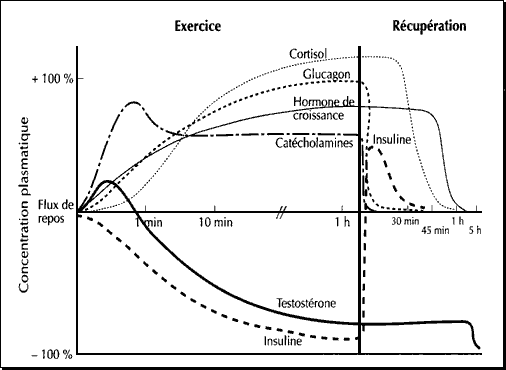
Hormonal system
Hormonal phenomena play a very important role in the cellular activity. Unfortunately, these phenomena are particularly complex, so we present here only the main functions of the hormonal system.
Endocrinal system has for role to produce the chemical substances which regulate cellular activity. These substances are transported by the blood (and the lymph). At any time, about forty different hormones are present in the blood.
The central nervous system, through the hypothalamus, controls the hormonal secretion which acts in return on the nervous function (feedback). The hypophisis, situated under the hypothalamus, secretes fundamental hormones: GH (growth hormone), ACTH, TSH, etc., which act on the peripheral endocrine glands.
The main "peripheral" hormones are grouped as follow:
Catecholamins (adrenalin, noradrenalin) are produced by the medullosurrenals. They act on the heart rate and the expansion/contraction of vessels.
Corticosteroids (aldosterone, cortisol) are produced by the corticosurrenals. They act on the management of energy reserves.
Thyroid hormones (thyroxin, triiodothyroxin, calcitonin) act on the growth and the normal development of cells.
Pancreatic hormones (insulin, glucagon) regulate the concentration of glucose in the blood (glycemia).
Sexual hormones (testosterone, progesterone) are produced by testicles and ovaries. They act on sexual specificities.
Hormonal production (long and intense effort)

N.B. Testosterone recovers generally the rest flow after 48 h.